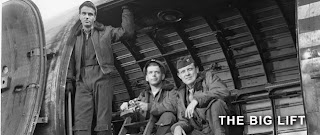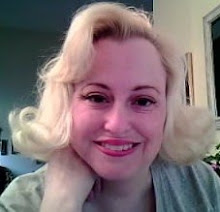Cast:
• Montgomery Clift - T/Sgt. Danny MacCullough
• Paul Douglas- M/Sgt. Henry "Hank" Kowalski
• Cornell Borchers - Frederica Burkhardt
• Bruni Löbel- Gerda
Crew:
• Director- George Seaton
• Written - George Seaton
• Produced - William Perlberg
• Music - Alfred Newman
Cast Notes:
Paul Douglas-was a Yale graduate. He played professional football with the Philadelphia Yellow Jackets before turning to regional theatre. He parlayed his love of athletics into a prosperous career as a sports announcer in the 1930s; in the next decade he became a radio actor and master of ceremonies (he was the announcer for bandleader Glenn Miller's final program in 1944). A frequent visitor to the Broadway stages, Douglas became a star in the tailor-made role of vulgar junk tycoon Harry Brock in Garson Kanin's play Born Yesterday, in which he was co-starred with Judy Holliday. After 1,024 appearances as Harry Brock, Douglas made his first film, 1949's A Letter to Three Wives. An unlikely prospect for movie stardom with his burly build and longshoreman's voice, Douglas nonetheless remained popular throughout the 1950s. He is best remembered for his brace of baseball pictures, It Happens Every Spring (1949) and Angels in the Outfield (1951), and for his reteaming with Judy Holliday in 1956's The Solid Gold Cadillac. Among Douglas' five wives were actresses Virginia Field and Jan Sterling. Though the newspaper obituaries insisted that Paul Douglas had not been ill before his fatal heart attack in 1959, he looked so drawn and haggard in his last appearance on the TV series The Twilight Zone that the episode ("The Mighty Casey") had to be reshot with Jack Warden in Douglas' part. ~( Hal Erickson, All Movie Guide)
Montgomery Clift- This film was the 2nd of the 4 military themed movies that he would star in. The first was The Search (1949), The Big Lift (1950), From Here to Eternity (1953) and The Young Lions (1958). The Search is also a gem and quite similar in style and theme to The Big Lift. The Young Lions (with Brando and Dean Martin) is also worth seeing.
Production Notes:
The film was released on April 26, 1950, less than one year after the Soviet blockade of Berlin was lifted and the air lift operations ceased. Because the film was shot in Berlin in 1949, it provides a unique glimpse of the post-war state of the city as it struggles to recover from the devastation wrought by World War II.
The actual Air Traffic Control system at Templehof is portrayed in the film, permitting the viewer to vicariously experience the frustration experienced by both controllers and aircrews during missions, including being buzzed by Soviet fighters while in formation.
All military roles except those of Clift and Douglas were portrayed by actual military personnel stationed in Berlin.
Plot:
It was shot on location in the city of Berlin, Germany, and tells the story of two U.S. Air Force sergeants (played by Montgomery Clift and Paul Douglas) who meet and fall in love with two women in Berlin during the 1948-1949 Berlin Airlift. This was Monty’s 4th film and Paul’s 5th.
The story begins at the start of the Berlin Blockade, as Allied forces begin airlifting food, fuel and other supplies from their zones of occupation into Berlin. U.S. Air Force sergeants Danny MacCullough (Montgomery Clift), flight engineer of a C-54 Skymaster, and Henry "Hank" Kowalski (Paul Douglas), an air traffic controller, are friends sent to Germany from a base in Hawaii to beef up the operation. Kowalski, who was captured and tortured by Germans during the war, has openly mixed feelings about helping in the cause.
During a public relations event staged at the Tempelhof Airport in the American sector, MacCullough meets an attractive German woman, Frederica Burkhardt (Cornell Borchers). MacCullough does not know that getting involved with Frederica will be an adventure. She offers to show him around Berlin some time when he gets a day off. To her surprise, MacCullough shows up at her work "address", where she is separating usable bricks from rubble on the streets of Berlin. While walking Frederica home, MacCullough bumps into a painter who spills paint all over him. Frederica offers to give it to the cleaners. She finds new civilian clothing for MacCullough to wear. He discovers that he left his ID papers in his uniform. He has to walk around Berlin without papers, which is very dangerous at this particular time in history. During the tour of the city, they get stuck at the border between West and East Berlin without proper papers, and escape when the incident becomes comically bungled by the authorities arguing over the exact location of the boundary.
Under the deadline pressure of being ordered back to the United States, McCullough proposes to Frederica, and she accepts his proposal. McCullough starts to plan the wedding.
Meanwhile, Hank Kowalski has also met a woman, Gerda (Bruni Löbel). She works at Tempelhof Airport mobile concession stand. She asks a lot of questions about America’s history and is trying to learn about the US. At times, Kowalski mocks her. Their bickering offers some of the funniest moments in the movie. He has contempt for most Germans and does not trust them. Gerda is the only German he trusts.
At her apartment building, Frederica’s neighbor offers to mail her letters. Lately, he has become suspicious of her. At a party he meets Hank and Gerta. Hank is suspicious of her too. The contents of the letter are given to Hank just before McCullough marries her. He passes the letters to McCullough to interrupt the wedding. She is not in love with him, but is exploiting his emotions to get to America, where her German lover lives.
Hank, on the other hand, finds that he is in love with Gerda when she suddenly fights back in their arguments. That is the moment that he falls in love with Gerda and lets his guard down. Kowalski decides to stay in Berlin.
McCullough gets his uniform back from the cleaners one size too small ,and gets on the next plane to the U.S.
Trivia:
• Monty famously rejected the role eventually played by William Holden in Sunset Boulevard. He rejected many other parts including Bus Stop (the Don Murray role), Moby Dick (Gregory Peck), Trapeze (Tony Curtis), Shane (Alan Ladd), A Star is Born (James Mason), On the Waterfront (Marlon Brando), Mrs Miniver (Richard Ney), Rio Bravo (Dean Martin) and East of Eden (James Dean).
• Monty and Marlon Brando were often touted as rivals during the 50s - both were born in Omaha, Nebraska.
Final Thought:
At first, I did not think I would like this movie. I watched it because I like Monty. This was Monty’s 4th film and he relied on his acting coach to be on set during his scenes. It caused a little friction with the cast and crew, but you cannot see it in his acting. Paul Douglas was outstanding in this movie and I think he stole the show. The film does a good job of showing the destroyed Berlin trying to recover. Rubble is everywhere. I enjoyed this movie and history buffs will like it. It is shown on Fox Movie Channel and I think that TCM has it in their library.
























.jpg)


No comments:
Post a Comment
Thanks for your comment!